
Two leading human rights organisations based in Israel, B’Tselem and Physicians for Human Rights, say Israel is committing genocide against Palestinians in Gaza and the country’s western allies have a legal and moral duty to stop it.
In reports published on Monday, the two groups said Israel had targeted civilians in Gaza only because of their identity as Palestinians over nearly two years of war, causing severe and in some cases irreparable damage to Palestinian society.
Multiple international and Palestinian groups have already described the war as genocidal, but reports from two of Israel-Palestine’s most respected human rights organisations, who have for decades documented systemic abuses, is likely to add to pressure for action.
The reports detailed crimes including the killing of tens of thousands of women, children and elderly people, mass forced displacement and starvation, and the destruction of homes and civilian infrastructure that have deprived Palestinians of healthcare, education and other basic rights.
“What we see is a clear, intentional attack on civilians in order to destroy a group,” said Yuli Novak, the director of B’Tselem, calling for urgent action. “I think every human being has to ask himself: what do you do in the face of genocide?”
It is vital to recognise that a genocide is under wayeven without a ruling in the case before the international court of justice, she said. “Genocide is not just a legal crime. It’s a social and political phenomenon.”
Physicians for Human Rights (PHR) focuses in its report on a detailed chronological account of the assault on Gaza’s health system, with many details documented directly by the group’s own team, which worked regularly in Gaza before 7 October 2023.
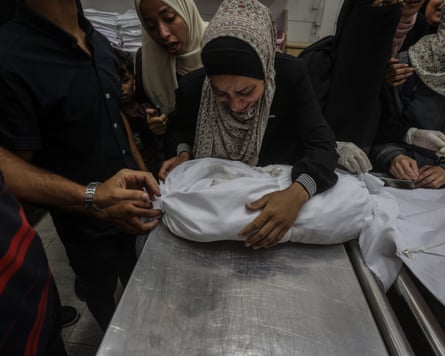
Relatives of Palestinians who lost their lives during Israeli attacks mourn during a funeral ceremony at al-Shifa hospital in Gaza City. Photograph: Anadolu/Getty Images
“You don’t have to have all five articles of the genocide convention to be fulfilled in order for something to be genocide,” he said, although the report also details other genocidal aspects of Israel’s war.
Both B’Tselem and PHR said Israel’s western allies were enabling the genocidal campaign, and shared responsibility for suffering in Gaza. “It couldn’t happen without the support of the western world,” Novak said. “Any leader that is not doing whatever they can to stop it is part of this horror.”
The US and European countries have a legal responsibility to take stronger action than they have done so far, Shalev said. “Every tool in the toolbox should be used. This is not what we think, this is what the genocide convention calls for.”
Israel denies is it carrying out a genocide, and says the war in Gaza is one of self-defence after cross-border attacks by Hamas on 7 October 2023 killed 1,200 people, the majority civilians. More than 250 others were kidnapped and taken to Gaza, where 50 remain held hostage, with 20 of them believed to still be alive.
A key element to the crime of genocide, as defined by the international convention, is showing intent by a state to destroy a target group in whole or part.
Genocidal statements from politicians and military leaders, and a chronology of well-documented impacts on civilians after nearly two years of war are proof of that intent, even without a paper trail of orders from the top, both PHR and B’Tselem say.
The PHR report details how “genocidal intent may be inferred from the pattern of conduct”, citing legal precedent from the International Criminal Tribunal for Rwanda.
The extensive documentation, by medics, media and human rights organisations over a long period of time, meant Israel’s government could not claim it did not understand the impact of its actions, Shalev said. “There were enough times and enough opportunities for Israel to stop this gradual systematic attack.”
Incitement to genocide has been recorded since the start of the war. It is one of two issues on which the Israeli judge hearing the case at the international court of justice voted with the majority when ordering emergency measures for the protection of Palestinians from the plausible risk of genocide.
“We don’t need to guess what Israel is doing and what the Israeli army is doing, because from the first day of this attack, Israeli leaders, the highest leadership, political leadership, including the prime minister, the minister of defence, the president of Israel said exactly that,” Novak said.
“They talked about human animals. They talked about the fact that there are no civilians in Gaza or that there is an entire nation responsible for 7 October.”
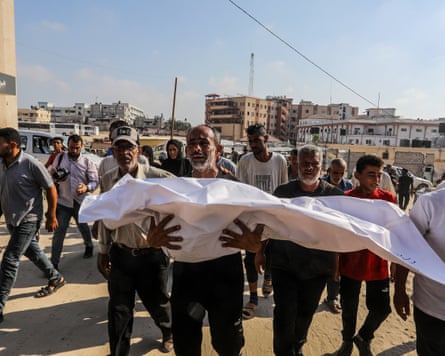
Palestinians bring the bodies of victims of Israeli attacks to Nasser hospital in Khan Younis on Monday. Photograph: Anadolu/Getty Images
“If the leadership of Israel, whether the army leadership and the political leadership, knows about the consequences of this policy and keep going, it is very clear that is intentional.”
The destruction of health infrastructure, two years without medical care and the killing of medical workers also meant the toll from the genocide would continue to mount even after any ceasefire halts fighting, Shalev said.
“For example, there have been no MRI machines in Gaza for months now, so what about all the illnesses and diseases that were not diagnosed all that time. There are all the malnutrition and chronic diseases that went untreated, we’re going to see the effects of that for months and years to come.”
While medication can be brought in within days, there is no easy way to replace medical workers who have been killed, including specialists who took decades to train, he said.
“Looking at the conditions of life opens this kind of temporal scale that is frightening if we want to believe in a future where … the people of Gaza somehow get to live their lives safely and in good health. It’s very hard to see that.”
The death toll in Gaza from the war is approaching 60,000, or more than 2.5% of the prewar population. Some of those who defend Israel’s war argue that is too low for the campaign to be considered genocide.
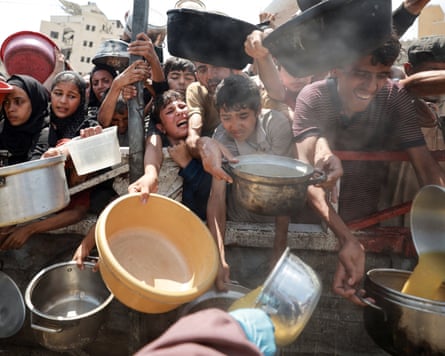
Palestinians wait to receive food from a charity kitchen in Gaza City. Photograph: Khamis Al-Rifi/Reuters
That is based on a fundamental misunderstanding of the crime of genocide, which the convention defines as targeting a group “in whole or in part”, Novak said. “It doesn’t mean that you need to kill each and every person.”
A genocide targeting Palestinians as a group was possible only because Israel for decades dehumanised Palestinians and denied their rights, Novak said. Collective trauma was exploited by far-right politicians to accelerate an agenda they had been pursuing for years.
“[7 October ] was a shocking moment and a turning point for Israelis because it instilled a real sincere feeling of existential threat. That was the moment that pushed a whole system and how it operates in Gaza from a policy of control and oppression into one of destruction and extermination.”
Now Israel had launched a genocidal campaign in Gaza, there was an urgent risk that it could spread to target other Palestinians, the B’Tselem report warned.
“The Israeli regime now has a new tool that they didn’t use before – genocide. And the fact that this tool or this policy used in Gaza is not yet [deployed] in other areas is not something that we can count on for long,” Novak said.
The West Bank is a particular concern, with almost 1,000 Palestinians killed and more than 40,000 displaced from communities including Jenin and Tulkarem, in a campaign of escalating attacks and ethnic cleansing since 7 October 2023.
“What we see is basically the same regime with the same logic, the same army, usually the same commanders and even the same soldiers who just fought in Gaza. They are now in the West Bank where violence is on the rise,” Novak said.
“What we worry about and want to warn about is the fact that any small trigger might make the genocide spill over from Gaza into the West Bank.”
Source: The Guardian


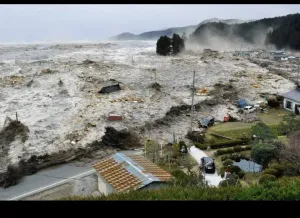

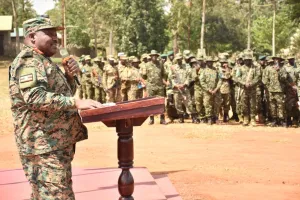
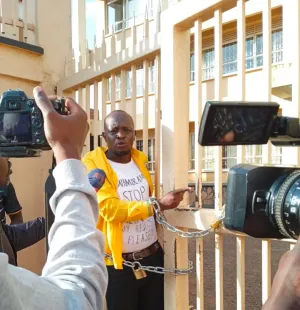






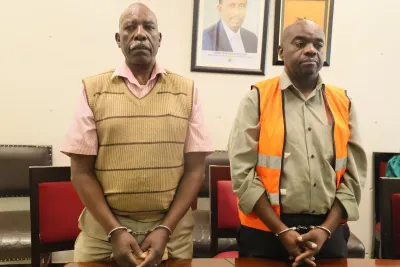
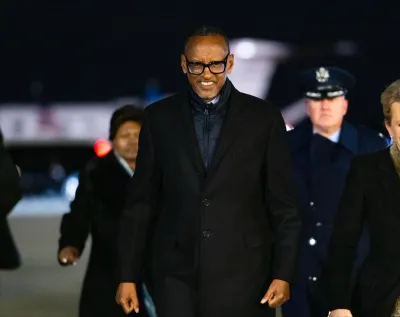
Guest Writer
Leave a Comment
Your email address will not be published.